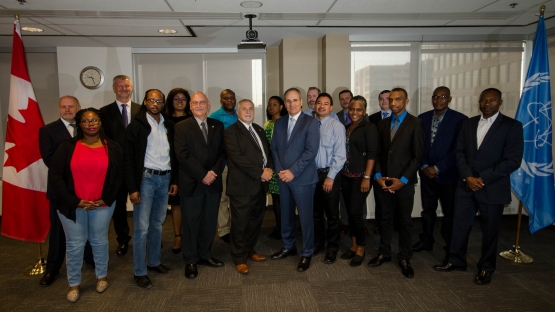Ensuring a high level of safety in the use of nuclear materials and radiation sources around the world is an important global challenge. The utilization of such material for the benefit of humankind must be managed in a safe manner, and the IAEA Safety Standards are designed to facilitate the achievement of that goal.
Nine Caribbean countries[1] are currently participating in a Regional Training Course on “Implementation of a National Regulatory Programme for the Control of Radiation Sources” the first course specifically focused on the needs of Caribbean IAEA Member States. The course began in September 2017, in Ottawa, Canada, under an IAEA regional technical cooperation project[2], with active support from the Canadian Nuclear Safety Commission (CNSC) and the United States Nuclear Regulatory Commission (NRC).
The four-week course, which was opened jointly by Mr Ramzi Jammal, CNSC’s Executive Vice-President, and Mr Saul Perez Pijuan, Section Head in the IAEA’s Division for Latin America and the Caribbean, aims to provide participants with the opportunity to build their competence and expertise in the establishment and operation of an adequate regulatory programme for the safety of radiation sources: “We have just completed compiling our inventory of radioactive sources and we are starting to build our legal framework and registering facilities using radioactive sources. I’m interested in learning about the inspection process and regulatory action for when we have our legal framework in place” said Ms Isabella Miriam John, Senior Health Official, Environmental Health Department from Dominica.
The training course consists of three distinct segments: one week of ‘core training’; two weeks of ‘specific training’ (which includes visits to medical and industrial facilities) in Ottawa; and a week-long ‘on the job training’, including authorization and inspection of radiation sources at three different Canadian locations.
The course is designed to provide the Caribbean participants with the knowledge they need to establish and operate national radiation safety infrastructure in their respective countries, in order to implement the International Basic Safety Standard (GSR Part 3) requirements and promote the Code of Conduct on the Safety and Security of Radioactive Sources. It also provides participants with important opportunities to meet fellow colleagues from the region, and facilitates cooperation and networking as well as knowledge transfer within the framework of the Technical Cooperation Programme in Latin America and the Caribbean: “This training will provide information on what other Caribbean countries and Canada have in terms of regulatory frame work and will allow me to explore what will work for Belize”, said Mr Jorge Franco, Environmental Officer, Department of the Environment, Belize.
__________
[1] Antigua and Barbuda, Bahamas, Barbados, Belize, Dominica, Guyana, Haiti, Jamaica, as well as Trinidad and Tobago
[2] RLA/9/082 “Establishing and Strengthening Sustainable National Regulatory Infrastructures for the Control of Radiation Sources”
Radiation regulation, safety and security regulation and license certification are all top priorities for our organization. This training has provided our staff with a strong technical base and we look forward to applying this training in a hands-on project.



